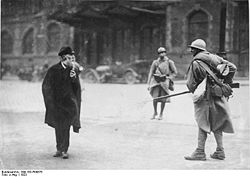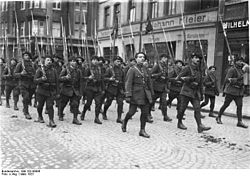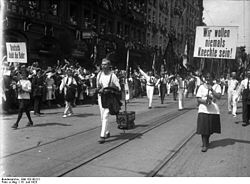- Occupation of the Ruhr
-
The Occupation of the Ruhr between 1923 and 1925, by troops from France and Belgium, was a response to the failure of the German Weimar Republic under Chancellor Cuno to pay reparations in the aftermath of World War I.
Contents
Background
By late 1922, the German defaults on payments had grown so serious and regular that a crisis engulfed the Reparations Commission; the French and Belgian delegates urged occupying the Ruhr as a way of pressuring Germany to make more of an effort to pay, while the British delegate urged a lowering of the payments.[1] As a consequence of an enormous German default on timber deliveries in December 1922, the Reparations Commission declared Germany in default, which led to the Franco-Belgian occupation of the Ruhr in January 1923.[2] Particularly galling to the French was that the timber quota the Germans defaulted on was based on an assessment of their capacity the Germans made themselves and subsequently lowered.[3] There was little doubt among the Allies that the government of Chancellor Wilhelm Cuno had defaulted on the timber deliveries deliberately as a way of testing the will of the the Allies to enforce the treaty.[3] Providing more fuel for the fire was a German default on coal deliveries in early January 1923, which was the thirty-fourth coal default in the last thirty-six months.[4] The French Premier Raymond Poincaré was deeply reluctant to order the Ruhr occupation and took this step only after the British had rejected his proposals for more moderate sanctions against Germany.[5] Frustrated at Germany's unwillingness to pay reparations, Poincaré hoped for joint Anglo-French economic sanctions against Germany in 1922 and opposed military action. However by December 1922 he was faced with Anglo-American-German opposition and saw coal for French steel production and money for reconstructing the devastated industrial areas draining away. Poincaré was exasperated with British failure to act, and wrote to the French ambassador in London:
"Judging others by themselves, the English, who are blinded by their loyalty, have always thought that the Germans did not abide by their pledges inscribed in the Versailles Treaty because they had not frankly agreed to them. ... We, on the contrary, believe that if Germany, far from making the slightest effort to carry out the treaty of peace, has always tried to escape her obligations, it is because until now she has not been convinced of her defeat. ... We are also certain that Germany, as a nation, resigns herself to keep her pledged word only under the impact of necessity".[6]
Poincaré decided to occupy the Ruhr in 11 January 1923 to extract the reparations himself. The real issue during the Ruhrkampf (Ruhr struggle) in 1923 as the Germans labelled the battle against the French occupation was not the German defaults on coal and timber deliveries but the sanctity of the Versailles treaty.[7] Poincaré often argued to the British that letting the Germans defy Versailles in regards to the reparations would create a precedent that would lead to the Germans dismantling the rest of the Versailles treaty.[8] Finally, Poincaré argued that once the chains that had bound Germany in Versailles were destroyed, it was inevitable that Germany would plunge the world into another world war.[8]
Initiated by French Prime Minister Raymond Poincaré, the invasion took place on January 11, 1923. Some theories state that the French aimed to occupy the centre of German coal, iron, and steel production in the Ruhr area valley simply to get the money Germany owed. Some others state that France did it to ensure that the reparations were paid in goods, because the Mark was practically worthless because of hyperinflation that already existed at the end of 1922. France had the iron ore and Germany had the coal. Each state wanted free access to the resource it was short of, as together these resources had far more value than separately. (Eventually this problem was resolved in the European Coal and Steel community.)
Following France's decision to invade the Ruhr,[9] the Inter-Allied Mission for Control of Factories and Mines [M.I.C.U.M.][10] was set up as a means of ensuring coal repayments from Germany.[11]
Passive resistance
The occupation was initially greeted by a campaign of passive resistance, and a few incidents of sabotage. Approximately 130 German civilians were killed by the French occupation army during the events (including Albert Leo Schlageter). Some theories assert that to pay for "passive resistance" in the Ruhr, the German government began the hyper-inflation that destroyed the German economy in 1923.[7] Others state that the road to hyperinflation was well established before with the reparation payments that started on November 1921.[12] (see 1920s German inflation) In the face of economic collapse, with huge unemployment and hyperinflation, the strikes were eventually called off in September 1923 by the new Gustav Stresemann coalition government, which was followed by a state of emergency. Despite this, civil unrest grew into riots and coup attempts targeted at the government of the Weimar Republic, including the Beer Hall Putsch. The Rhenish Republic was proclaimed at Aachen (Aix-la-Chapelle) in October 1923.
Though the French did succeed in making their occupation of the Ruhr pay, the Germans through their "passive resistance" in the Ruhr and the hyperinflation that wrecked their economy, won the world's sympathy, and under heavy Anglo-American financial pressure (the simultaneous decline in the value of the franc made the French very open to pressure from Wall Street and the City), the French were forced to agree to the Dawes Plan of April 1924, which substantially lowered German reparations payments.[13] Under the Dawes Plan, Germany paid only 1 billion marks in 1924, and then increasing large sums for the next three years, until the total rose to 2.25 billion marks by 1927.[14]
Internationally the occupation did much to boost sympathy for Germany, although no action was taken in the League of Nations since it was legal under the Treaty of Versailles.[15] The French, with their own economic problems, eventually accepted the Dawes Plan and withdrew from the occupied areas in July and August 1925. The last French troops evacuated Düsseldorf, Duisburg along with the city's important harbour in Duisburg-Ruhrort, ending French occupation of the Ruhr region on August 25, 1925. The occupation of the Ruhr "was profitable and caused neither the German hyperinflation, which began in 1922 and ballooned because of German responses to the Ruhr occupation, nor the franc's 1924 collapse, which arose from French financial practices and the evaporation of reparations".[16] The profits, after Ruhr-Rhineland occupation costs, were nearly 900 million gold marks.[17]
Results
To deal with the implementation of the Dawes Plan, a conference took place in London in July–August 1924.[18] The British Prime Minister Ramsay MacDonald, who viewed reparations as impossible to pay successfully pressured the French Premier Édouard Herriot into a whole series of concessions to Germany.[18] The British diplomat Sir Eric Phipps commented that “The London Conference was for the French 'man in the street' one long Calvary as he saw M. Herriot abandoning one by one the cherished possessions of French preponderance on the Reparations Commission, the right of sanctions in the event of German default, the economic occupation of the Ruhr, the French-Belgian railroad Régie, and finally, the military occupation of the Ruhr within a year”.[19] The Dawes Plan was a momentous moment in European history as it marked the first time that Germany had succeeded in defying Versailles, and revised an aspect of the treaty in its favour.
See also
 Media related to Occupation of the Ruhr (1923) at Wikimedia Commons
Media related to Occupation of the Ruhr (1923) at Wikimedia Commons- History of the Ruhr
Notes
- ^ Marks, Sally "The Myths of Reparations" pages 231-255 from Central European History, Volume 11, Issue # 3, September 1978 pages 239-240.
- ^ Marks, Sally "The Myths of Reparations" pages 231-255 from Central European History, Volume 11, Issue # 3, September 1978 pages 240-241.
- ^ a b Marks, Sally "The Myths of Reparations" pages 231-255 from Central European History, Volume 11, Issue # 3, September 1978 page 240.
- ^ Marks, Sally "The Myths of Reparations" pages 231-255 from Central European History, Volume 11, Issue # 3, September 1978 page 241.
- ^ Marks, Sally "The Myths of Reparations" pages 231-255 from Central European History, Volume 11, Issue # 3, September 1978 page 244.
- ^ Leopold Schwarzschild, World in Trance (London: Hamish Hamilton, 1943), p. 140.
- ^ a b Marks, Sally "The Myths of Reparations" pages 231-255 from Central European History, Volume 11, Issue # 3, September 1978 page 245.
- ^ a b Marks, Sally "The Myths of Reparations" pages 231-255 from Central European History, Volume 11, Issue # 3, September 1978 pages 244-245.
- ^ Fischer p 28
- ^ Fischer, p. 42
- ^ Fischer, p 51
- ^ Ferguson, Adam; When Money Dies: The Nightmare of Deficit Spending, Devaluation and Hyperinflation in Weimar Germany' p. 38. ISBN 1586489941
- ^ Marks, Sally "The Myths of Reparations" pages 231-255 from Central European History, Volume 11, Issue # 3, September 1978 pages 245-246.
- ^ Marks, Sally "The Myths of Reparations" pages 231-255 from Central European History, Volume 11, Issue # 3, September 1978 pages 247.
- ^ Walsh, p. 142
- ^ Sally Marks, '1918 and After. The Postwar Era', in Gordon Martel (ed.), The Origins of the Second World War Reconsidered. Second Edition (London: Routledge, 1999), p. 26.
- ^ Marks, p. 35, n. 57.
- ^ a b Marks, Sally "The Myths of Reparations" pages 231-255 from Central European History, Volume 11, Issue # 3, September 1978 page 248.
- ^ Marks, Sally "The Myths of Reparations" pages 231-255 from Central European History, Volume 11, Issue # 3, September 1978 page 249.
Bibliography
- Michael Ruck, Die Freien Gewerkschaften im Ruhrkampf 1923 (Frankfurt am Main, 1886);
- Barbara Müller, Passiver Widerstand im Ruhrkampf. Eine Fallstudie zur gewaltlosen zwischenstaatlichen Konfliktaustragung und ihren Erfolgsbedingungen (Münster, 1995);
- Stanislas Jeannesson, Poincaré, la France et la Ruhr 1922-1924. Histoire d'une occupation (Strasbourg, 1998);
- Elspeth Y. O'Riordan, Britain and the Ruhr crisis (London, 2001);
- Gerd Krüger, Das "Unternehmen Wesel" im Ruhrkampf von 1923. Rekonstruktion eines misslungenen Anschlags auf den Frieden, in Horst Schroeder, Gerd Krüger, Realschule und Ruhrkampf. Beiträge zur Stadtgeschichte des 19. und 20. Jahrhunderts (Wesel, 2002), pp. 90–150 (Studien und Quellen zur Geschichte von Wesel, 24) [esp. on the background of so-called 'active' resistance];
- Conan Fischer, The Ruhr Crisis, 1923-1924 (Oxford / New York, 2003);
- Gerd Krumeich, Joachim Schröder (eds.), Der Schatten des Weltkriegs: Die Ruhrbesetzung 1923 (Essen, 2004) (Düsseldorfer Schriften zur Neueren Landesgeschichte und zur Geschichte Nordrhein-Westfalens, 69);
- Sally Marks "The Myths of Reparations" pages 231-255 from Central European History, Volume 11, Issue # 3, September 1978
- Gerd Krüger, "Aktiver" und passiver Widerstand im Ruhrkampf 1923, in Günther Kronenbitter, Markus Pöhlmann, Dierk Walter (eds.), Besatzung. Funktion und Gestalt militärischer Fremdherrschaft von der Antike bis zum 20. Jahrhundert (Paderborn / Munich / Vienna / Zurich, 2006), pp. 119–30 (Krieg in der Geschichte, 28);
- Ben Walsh, GCSE modern world history;
Categories:- Economic history of France
- French Third Republic
- 1923 in Germany
- 1924 in Germany
- 1923 in France
- 1924 in France
- 1925 in France
- Military occupation
- Military history of Belgium
- French Army
- Aftermath of World War I
- 1925 in international relations
- 1924 in international relations
- 1923 in international relations
- History of North Rhine-Westphalia
Wikimedia Foundation. 2010.



